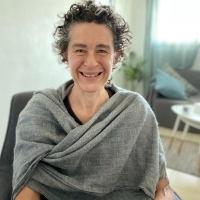Credentials
Finances
Licensed in Israel
Licensed Abroad
- Migdali Eilat, Malkat Shva 7
- Eilat, 88243
Lisa Green
 Verified
Verified
Credentials
Clinical Psychologist
D.ClinPsy
Finances
350-500 NIS
None
None
ABOUT THE THERAPIST
Sometimes people come to me with specific problems such as anxiety, trauma or OCD. Other times people choose therapy because they have a vaguer sense of dissatisfaction or stuckness in their lives. Or perhaps they may be wishing to work on relationship or childhood issues or adjusting to life in a different country. I am a senior clinical psychologist, fully licensed in both Israel and the UK, with over 15 years’ experience. I have worked in Eilat and the Arava for a decade and offer therapy in English or Hebrew, mainly with adults – either face-to-face or online.
Over the years my training has included a range of therapeutic approaches, including: CBT (cognitive behavioural therapy), ACT (acceptance and commitment therapy) and EMDR (eye movement desensitization and reprocessing) all underpinned by a solid psychodynamic foundation. This breadth of experience and training enables me to be flexible in what I offer clients: tailoring my approach to what works best for each person. In a warm, calm environment I help people to make sense of and understand their difficulties and explore ways to improve the situation.
QUALIFICATIONS
D.ClinPsy
University College London
2003
Degree
D.ClinPsyEducation
University College LondonYear of Graduation
2003Years in Practice
21
REGISTERED PSYCHOLOGIST IN ISRAEL
Registration in Pinkas Hapsichologim
27-8100
Mumche Category
Clinical Psychologist
Mumche License Number
27-36935
LICENSED ABROAD
License Number
BPS 83726, HCPC PYL15376 both UKDISTANCE COUNSELING
Telephone Counseling, Online Therapy
PRIMARY SPECIALTIES
Abuse
Anxiety / Panic
Depression
Life Transitions
Trauma / Post Traumatic Stress Disorder PTSD
ADDITIONAL SPECIALTIES
Academic
Adjustments
Attention Deficit Hyperactivity Disorder (ADHD)
Mood Disorders
Obsessive Compulsive Disorder (OCD)
Phobias
Self-Esteem
Sexual Abuse / Rape
Sleep / Insomnia
Stress Management
CLIENT FOCUS
Population
Adults
Men
Women
Geriatric
Languages Spoken
Hebrew
English
TREATMENT APPROACH
Acceptance and Commitment Therapy (ACT)Acceptance and Commitment Therapy (ACT) is a form of psychotherapy that encourages individuals to accept their thoughts, feelings, and experiences without judgment and to use them as tools to help them to make changes in their lives that are consistent with their values. It is based on the idea that by changing the way we think about our inner experiences, we can reduce emotional distress and increase our sense of well-being.
Cognitive Behavioral Therapy (CBT)Cognitive Behavioral Therapy (CBT) is a type of psychotherapy that focuses on how one's thoughts, feelings and behaviors are connected and can be changed. It is based on the idea that how we think (cognition) and how we feel (emotion) can influence how we behave. CBT helps people identify and challenge distorted thinking and replace it with more balanced thinking, leading to improved mood and behavior. ‘Homework’, usually containing practical writing exercises, is often completed by the client between sessions to reinforce the therapy. Examples of tools that practitioners often use are journaling, challenging beliefs, and mindfulness.
Eye Movement Desensitization and Reprocessing Therapy (EMDR)Eye Movement Desensitization and Reprocessing (EMDR) is a psychotherapy treatment that was originally designed to alleviate the distress associated with traumatic memories. It uses a structured approach to address the past events that may be causing current distress, and uses bilateral stimulation, such as eye movements, to activate different neural networks in the brain in order to reduce symptoms of trauma. EMDR has been found to be effective for a wide range of mental health issues, including anxiety, depression, and PTSD.
Mindfulness-Based Cognitive Therapy (MBCT)Mindfulness-Based Cognitive Therapy (MBCT) is a form of therapy that combines cognitive behavioral therapy with mindfulness practices. It is based on the idea that our thoughts, emotions, and physical sensations can affect our mental health. MBCT helps individuals become aware of their thoughts, emotions, and physical sensations in order to gain insight and control over them. MBCT helps clients learn how to recognize their sense of being and see themselves as separate from their thoughts and moods. This separation can free the client from thought patterns in which the repeated negative messages may be dominating the client’s focus. After developing an awareness of the separation between thoughts, emotions, and the self, people in treatment may find that while the self and the emotions may exist simultaneously, they do not have to exist within the same dimension. The healing can take place when one learns how to interject positive thoughts into negative moods and thereby create a shift in mood.
Psychodynamic TherapyPsychodynamic therapy is a form of therapy that focuses on the unconscious mind and how it affects behavior. It works to help people understand and work through past experiences and feelings that may be causing difficulties in the present. This type of therapy encourages individuals to explore their emotions, relationships, and behaviors in order to gain insight into their current difficulties. It can help individuals better understand themselves and their motivations, and gain insight into how past events have impacted their current lives. People tend to develop defense mechanisms when faced with challenges in life. Defense mechanisms may keep painful feelings, memories, and experiences in the unconscious. A few common defense mechanisms include: denial, repression, and rationalization. Psychodynamic therapists encourage people to speak freely about their emotions, desires, and fears. Being open may help uncover vulnerable feelings that have been pushed out of conscious awareness. According to psychodynamic theory, behavior is influenced by unconscious thought. Once painful feelings are brought forth and processed, the defense mechanisms are no longer needed and a person in treatment can start changing unhelpful patterns when coping with life’s challenges.
SERVICES OFFERED
Individual Therapy
Consultation
Hadrachat Horim
Workshops/Educating


 Verified
Verified


